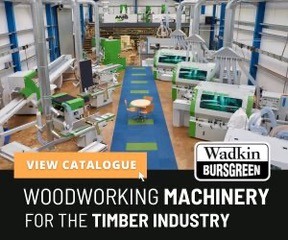With 29,000sq ftmodern production space, GD is a volume manufacturer of timber staircases, windows and doorsets – supplying nationwide to major private and social housing developers. Combining the latest machinery and production techniques with a local workforce of more than 55 skilled employees enables the company to provide effectively-managed, volume supply chain solutions.
Founder Glyn Ducker says: “We have dealt with Dust Control Services for many years and knew that they had the know-how and expertise required to determine the optimum locations for all machines, which in turn would allow them to design an extraction upgrade scheme which would be both efficient and economical to run.”
For the project, DCS engineers were able to call upon the extensive skills and technologies available from within the DCS Group to deliver a solution which incorporated DCS dust extraction and filtration, Ecogate ‘extraction-on-demand’ systems plus a customised spray finishing enclosure designed and manufactured by its Gallito operation.
Utilising as much of the existing ductwork and plant as possible, a new extraction system layout was devised that includes a total of four fans feeding wood waste to an externally-sited dust extraction system.
Designed to handle a total airflow capacity of 22,000 cubic metres per hour, the new system employs a high-efficiency modular filter with pressure-free discharge, via a rotary valve, into a wood waste transfer system. The filter unit is fitted with the Superbag polyester filter bags which employ a patented weaving technique, in tubular format, giving the filter bag a surface that can cope with varying filter loads.
Each extraction fan has an Ecogate Power Master variable speed drive unit with integral Ecogate greenBOX 12+ controller. Throughout the workshop, DCS fitted woodworking machines with automatic Ecogate motorised damper gates and sensors, which signal the greenBOX 12+ controller to open and close gates as machines come on or off line.
The controller automatically detects changes in extraction load and adjusts the fan speed accordingly. This means that power is only used when needed, and results in an extremely efficient extraction system which will significantly reduce electricity usage.
Glyn says: “In addition to upgrading all our extraction system, DCS were able to put forward a scheme for the design, manufacture and installation of a new custom-built spray booth and drying enclosure which would be sited on top of a mezzanine floor at the end of our workshop.”
Spray finishing specialist Gallito, now a part of the DCS Group, worked closely with DCS engineers on the project which first involved the re-location and adaptation of the complete mezzanine structure. Designed for the spraying of staircase components, a 25sq m enclosure was designed and fabricated by Gallito which incorporates two 2.5m wide dry-filter spray plenums and a large drying area.
An overhead, manually-operated conveyor system, complete with hanging frames and holding brackets, transports components into the enclosure for spraying, and then into the drying area to remain in a dust-free environment until completely dry.
“We believed from the outset that DCS would handle all aspects of the contract in a thoroughly professional way, and they didn’t disappoint. Its employees are extremely knowledgeable, very flexible, and are a credit to the company. The end result is that we now have a highly efficient extraction system that will save us thousands of pounds on electricity, and a paint finishing system which adds greatly to the quality of our staircase products.”








